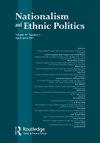National Identity During Covid-19: Evidence from the Vaccinated and the Unvaccinated in Israel
IF 0.7
Q3 ETHNIC STUDIES
引用次数: 0
Abstract
Abstract This article uses the case of the Covid-19 pandemic in Israel to examine whether there are differences in national identity between the vaccinated and the unvaccinated and how national identity is related to public views of the unvaccinated. A three-wave panel survey measuring national attachment, national chauvinism, and constructive patriotism from before and during the pandemic was used to trace differences in dimensions of national identity between the vaccinated and the unvaccinated and to explore their relationship to attitudes toward the unvaccinated. Findings indicated that national attachment was lower among the unvaccinated prior to the pandemic. However, regarding national chauvinism, there were no differences between the vaccinated and the unvaccinated over time; regarding constructive patriotism, there was a difference only in the third wave—at the end of the Covid-19 vaccination drive. The three dimensions of national identity were linked to negative attitudes toward the unvaccinated only at the end of the Covid-19 vaccination drive but not at the peak of the pandemic after the first lockdown. These findings are discussed in light of the current understanding of national identity during the pandemic.2019冠状病毒病期间的国家认同:来自以色列接种疫苗和未接种疫苗者的证据
摘要本文以以色列新冠肺炎疫情为例,探讨接种者与未接种者的国家认同是否存在差异,以及国家认同与公众对未接种者的看法之间的关系。一项测量大流行之前和期间的民族依恋、民族沙文主义和建设性爱国主义的三波小组调查用于追踪接种疫苗者和未接种疫苗者之间国家认同维度的差异,并探讨它们与对未接种疫苗者的态度之间的关系。调查结果表明,在大流行之前未接种疫苗的人群中,国家依恋程度较低。然而,在民族沙文主义方面,接种疫苗者和未接种疫苗者之间没有随时间变化的差异;在建设性爱国主义方面,只有在第三波——新冠疫苗接种运动结束时——才有所不同。只有在Covid-19疫苗接种运动结束时,国家认同的三个维度才与对未接种疫苗者的负面态度有关,而在第一次封锁后的大流行高峰期则与此无关。这些发现是根据目前对大流行期间国家认同的理解进行讨论的。
本文章由计算机程序翻译,如有差异,请以英文原文为准。
求助全文
约1分钟内获得全文
求助全文
来源期刊

Nationalism and Ethnic Politics
ETHNIC STUDIES-
CiteScore
1.30
自引率
0.00%
发文量
30
期刊介绍:
Nationalism & Ethnic Politics explores the varied political aspects of nationalism and ethnicity in order to develop more constructive inter-group relations. The journal publishes case studies and comparative and theoretical analyses. It deals with pluralism, ethno-nationalism, irredentism, separatism, and related phenomena, and examines processes and theories of ethnic identity formation, mobilization, conflict and accommodation in the context of political development and "nation-building". The journal compares and contrasts state and community claims, and deal with such factors as citizenship, race, religion, economic development, immigration, language, and the international environment.
 求助内容:
求助内容: 应助结果提醒方式:
应助结果提醒方式:


